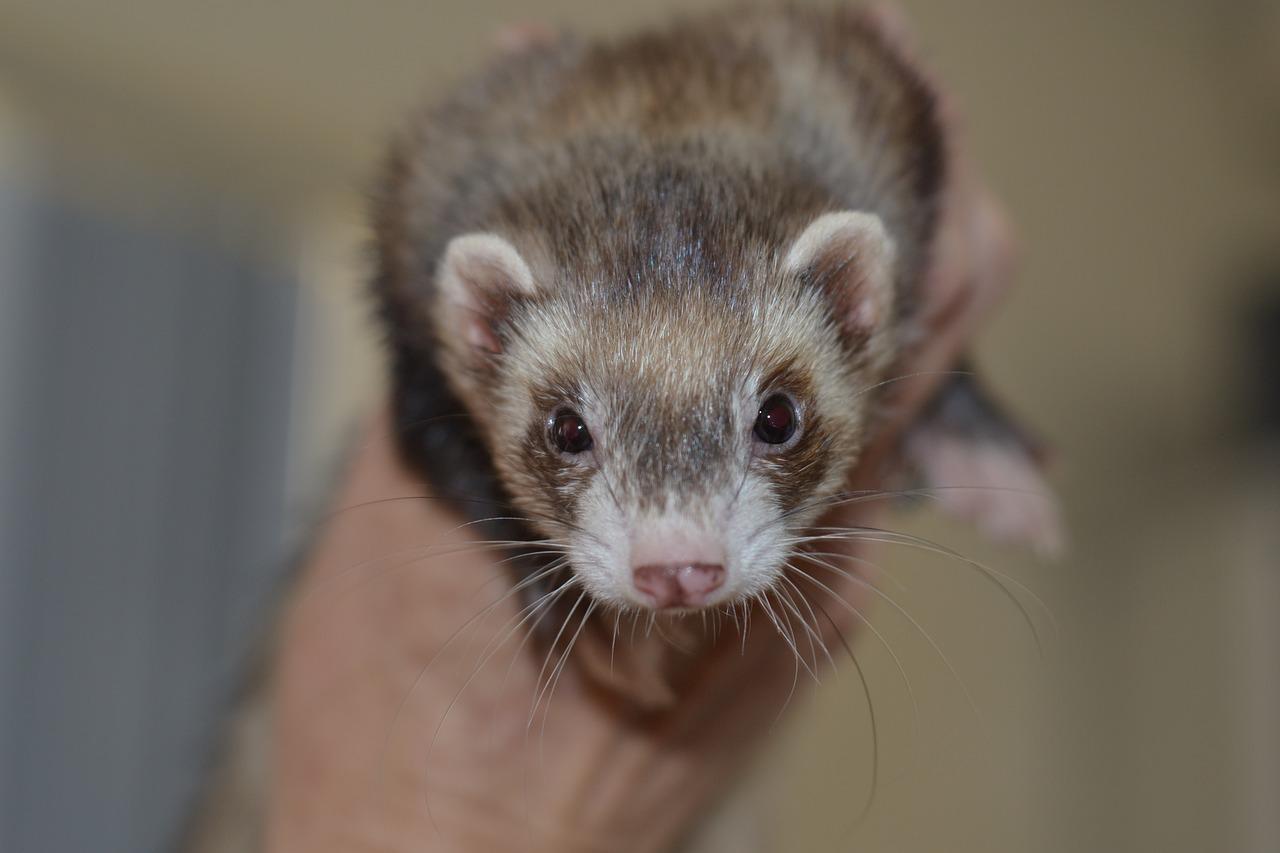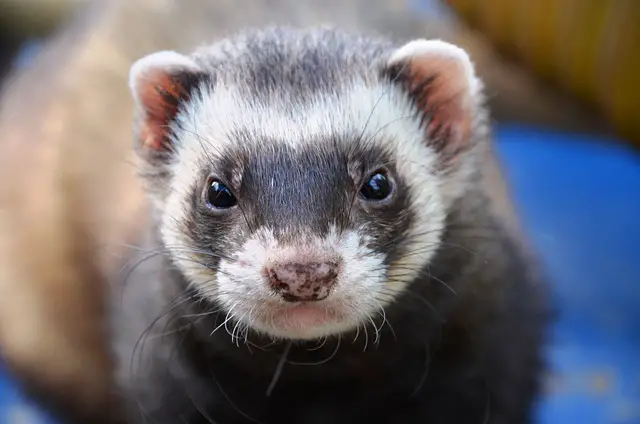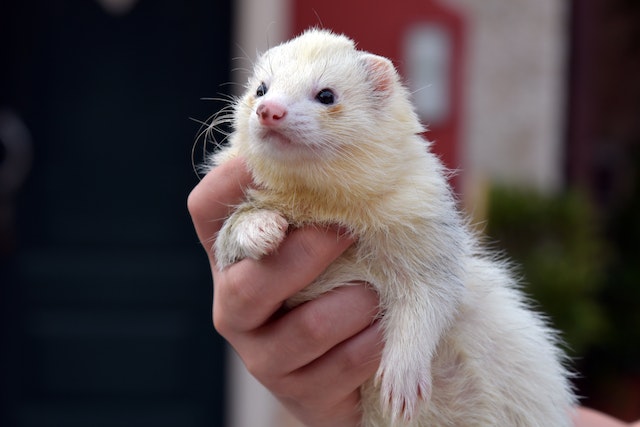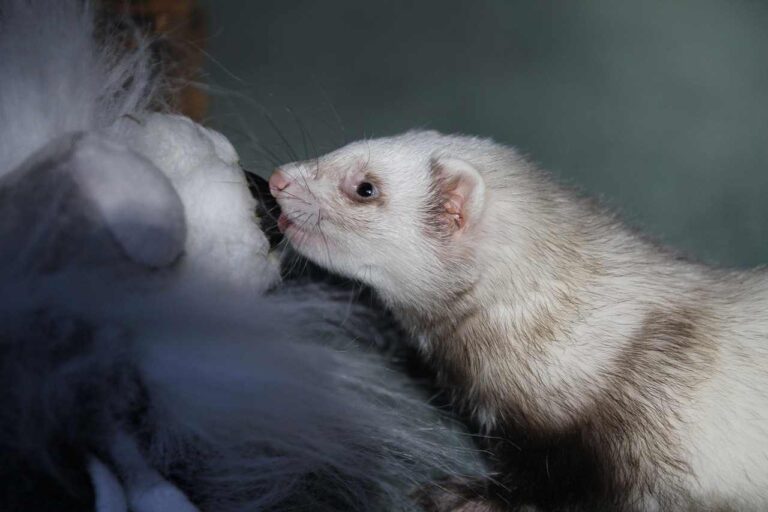11 Simple Signs Of Old Age In Ferrets With Care

Let’s discuss the signs of old age in ferrets…
Have you noticed your ferret slowing down or experiencing some changes lately? Well, it might be a sign that your little furball is entering their golden years.
In this blog post, we’ll explore some telltale signs of old age in ferrets, so you can provide them with the extra love and care they need to age gracefully.
Let’s jump right in, shall we?
Signs Of Old Age In Ferrets
As ferrets age, you may notice subtle changes in their behavior and physical appearance.
They may move more slowly, have decreased energy levels, and their fur may become thin and grayish in color.
Additionally, older ferrets may develop health issues such as dental problems and arthritis, requiring extra care and attention from their owners.
Let’s break it down further…
Here are some of the most common signs of old age in ferrets:
1. Hair Loss and Hair Thinning
As ferrets age, it’s not uncommon for them to experience changes in their coat. Hair loss and thinning can occur, particularly in older ferrets.
This can manifest as bald patches, especially around the tail and hindquarters. Additionally, you might notice a decrease in the overall thickness and luster of their fur.
It’s important to be mindful of any excessive or sudden hair loss, as it could be indicative of an underlying health issue such as adrenal disease.
Regular grooming and a balanced diet can help support the overall health and condition of their coat as they age.
2. Decreased Mobility
Aging ferrets may exhibit signs of decreased mobility as their joints and muscles become less agile.
You might observe that they have difficulty climbing, jumping, or navigating through their environment.
Providing lower platforms, ramps, and gentle, low-impact toys can make it easier for them to move around comfortably.
Additionally, ensuring that their living space is free from obstacles and hazards can help prevent accidental falls and injuries.
3. Personality and Temperament Changes
Just like humans, ferrets can experience changes in their personality and temperament as they age.
Some older ferrets may become less playful, while others might become more irritable or anxious. It’s important to be patient and understanding as they adapt to these changes.
Offering them a quiet and secure space where they can retreat when they need some alone time can help alleviate any stress they may be feeling.
4. Decreased Activity
Older ferrets may exhibit a decrease in overall activity levels and spend more time resting or sleeping.
This is a natural part of the aging process, and it’s important to provide them with a comfortable and cozy environment where they can relax undisturbed.
Offering soft bedding and warm, snug hiding spots can help them feel secure and content.
5. Changes in Sleep Patterns
As ferrets age, it’s common for them to experience changes in their sleep patterns.
While younger ferrets are known for their playful and active nature, older ferrets tend to sleep more and become less active.
You might notice that your elderly ferret spends more time napping or resting than engaging in energetic play sessions.
However, it’s essential to keep an eye on any sudden or drastic changes in sleep patterns, as they could also indicate an underlying health issue.
6. Dental Issues
Just like humans, ferrets can develop dental problems as they age. Dental issues in older ferrets can manifest as tartar buildup, gum disease, tooth decay, or even tooth loss.
You might observe signs such as bad breath, difficulty eating, drooling, or a decrease in appetite.
Regular dental check-ups and maintaining good dental hygiene, including appropriate chew toys and a healthy diet, can help prevent or manage dental problems in older ferrets.
7. Changes in Appetite
Changes in appetite are another common sign of old age in ferrets. As ferrets get older, they may experience a decline in their appetite.
They might become pickier eaters or show a reduced interest in their regular food. It’s crucial to monitor their eating habits and ensure they’re maintaining a healthy weight.
If you notice a significant decrease in appetite or weight loss, it’s essential to consult a veterinarian to rule out any underlying health issues.
8. Vision and Hearing Loss
Like many other mammals, ferrets can also experience age-related vision and hearing loss.
You may observe that your older ferret becomes less responsive to visual cues or starts bumping into objects.
They might also become less responsive to sounds, such as their name or familiar noises. It’s important to create an environment that accommodates their changing sensory abilities.
Keeping their living space consistent and minimizing sudden changes can help them navigate their surroundings more easily.
9. Behavioral Changes
As ferrets age, you may notice some changes in their behavior. They may become less active and spend more time sleeping or resting.
Older ferrets tend to have reduced energy levels and may not engage in playtime or exploration as much as they used to.
They may also exhibit a decreased interest in their surroundings or show less curiosity than when they were younger. Some older ferrets may become more irritable or less tolerant of handling or other pets.
However, it’s important to keep in mind that behavioral changes can also be due to underlying health issues, so it’s always a good idea to consult with a veterinarian if you notice significant changes in your ferret’s behavior.
10. Frequent Respiratory Issues
Respiratory issues can be common in older ferrets. As they age, their respiratory system may become more vulnerable to infections, allergies, or other respiratory conditions.
You might observe symptoms such as coughing, wheezing, labored breathing, or sneezing. Additionally, older ferrets may be more prone to respiratory infections, which can lead to nasal discharge or difficulty breathing.
If you notice any respiratory symptoms in your aging ferret, it’s crucial to seek veterinary care promptly, as respiratory issues can be serious and require treatment.
Read more about identifying a sick ferret.
11. Changes in Physical Structure
As ferrets age, you may observe noticeable changes in their physical structure. Older ferrets might experience weight loss or muscle wasting, resulting in a thinner appearance.
Their fur may become thin, dull, or develop patches of gray or white. In some cases, they may also develop lumps or tumors, although it’s important to note that not all lumps are cancerous.
Older ferrets may also experience dental problems, such as tooth decay or gum disease, which can affect their ability to eat properly. Regular veterinary check-ups and proper dental care are vital to monitor and address these changes.
Caring for Older Ferrets
Ferrets are wonderful and playful pets, and as they age, they require special care and attention to ensure their well-being.
Here are some of the effective ways to care for an older ferret:
1. Regular Veterinary Check-ups: Schedule routine check-ups with a veterinarian experienced in treating ferrets. They can identify any health issues early and provide appropriate care.
2. Balanced Diet: Older ferrets may have specific dietary needs. Provide a balanced diet consisting of high-quality ferret food, which is rich in protein and fat. Avoid feeding them a diet primarily based on carbohydrates. Consult your vet for specific dietary recommendations.
3. Adequate Hydration: Ensure your ferret has access to fresh water at all times. Older ferrets may have reduced thirst drive, so encourage them to drink by providing multiple water sources and using a water dish rather than a water bottle.
4. Dental Care: Dental problems can be common in older ferrets. Regularly check their teeth for signs of tartar buildup or gum disease. Brushing their teeth with a soft-bristled toothbrush and using dental treats can help maintain their oral health.
5. Exercise and Mental Stimulation: Engage your older ferret in gentle play sessions and provide them with toys that encourage mental stimulation. However, be mindful of their energy levels and limitations, as they may not be as active as when they were younger.
6. Comfortable Living Environment: Ensure your ferret’s living space is safe, comfortable, and suitable for their age. Provide a warm, quiet, and draft-free area for them to rest. Consider adding soft bedding or blankets for additional comfort.
7. Pain Management: Older ferrets may experience age-related conditions such as arthritis. If you notice any signs of discomfort or mobility issues, consult your vet. They may recommend pain management options, such as medication or supplements, to improve your ferret’s quality of life.
8. Regular Grooming: Older ferrets may have difficulty grooming themselves properly. Help them maintain a clean coat by gently brushing them with a soft brush or comb. Trim their nails regularly, being cautious not to cut them too short.
9. Bonding and Affection: Older ferrets need love and attention. Spend quality time with your ferret, offering gentle petting and affection. This helps strengthen the bond between you and provides them with emotional comfort.
Read more about identifying a dying ferret.
Related Questions
How can I tell if my ferret is getting old?
As ferrets age, they may become less active and sleep more. You might also notice changes in their fur color, and they may develop lumps or bumps on their skin. Additionally, older ferrets may experience weight loss or gain, as well as changes in their appetite.
Do older ferrets have specific health issues I should watch out for?
Yes, older ferrets are more prone to developing adrenal disease, insulinoma (a form of pancreatic cancer), and other age-related conditions. Keep an eye out for symptoms such as hair loss, lethargy, and increased thirst and urination. Regular check-ups with a veterinarian are essential for monitoring their health.
Should I adjust my older ferret’s diet and exercise routine?
Absolutely. Older ferrets may benefit from a diet that’s lower in fat and higher in protein to accommodate their changing metabolism. Additionally, gentle exercise can help keep their muscles and joints in good shape, so consider modifying their playtime to be less strenuous.
How can I make my older ferret more comfortable in its senior years?
Providing a cozy and easily accessible sleeping area is crucial. Older ferrets may also appreciate softer bedding to cushion their joints. Regular veterinary check-ups and a comfortable, stress-free living environment are also important for their well-being.
Is it normal for my older ferret to become more irritable or less sociable?
Yes, as ferrets age, they may become more irritable due to discomfort from age-related health issues. They may also become less sociable and less interested in play. However, sudden changes in behavior should always be evaluated by a veterinarian.
How long do ferrets typically live, and at what age are they considered old?
Ferrets generally live for about 6 to 8 years, although some may live up to 10 years or more with proper care. They are considered seniors at around 3 to 4 years of age, but individual ferrets may exhibit signs of old age at different times.
Conclusion
So there you have it! Keep an eye out for these signs as your ferret enters their golden years. Remember, just like us, they may need a little extra care and attention as they age. With love and proper veterinary care, you can ensure your furry friend enjoys a comfortable and happy life throughout their senior years.


![How to Train a Ferret Not to Bite [Helpful Tips] How to Train a Ferret Not to Bite](https://petcreeks.com/wp-content/uploads/2023/12/istockphoto-177817907-612x612-1.jpg)


![How Do Ferrets Show Affection [12 Easy Signs] How Do Ferrets Show Affection](https://petcreeks.com/wp-content/uploads/2023/10/pexels-evgeniya-litovchenko-9083453.jpg)
![Why Ferrets Bite [11 Reasons & Remedies] Why Ferrets Bite](https://petcreeks.com/wp-content/uploads/2023/10/ferret-1972523_640.jpg)